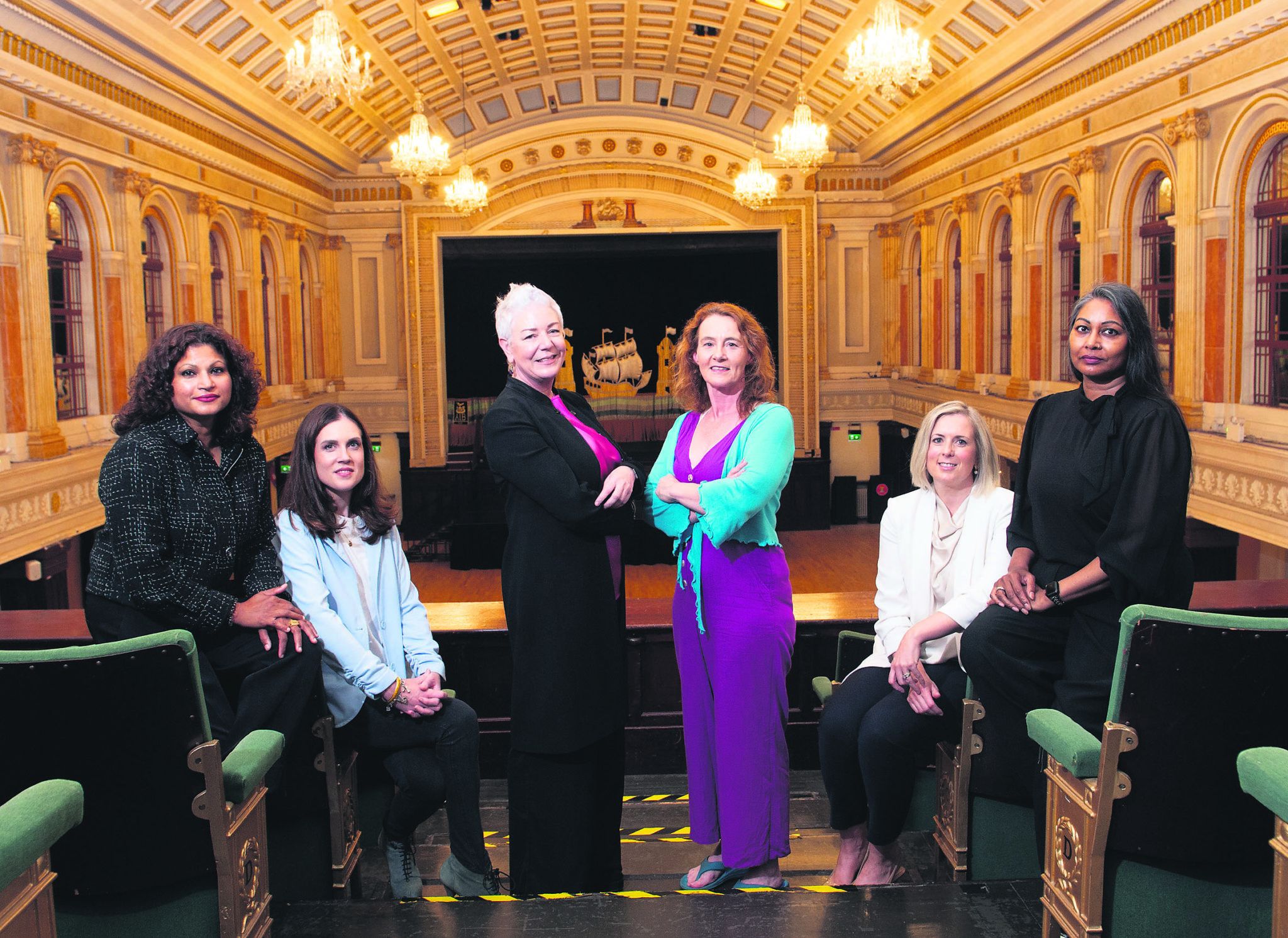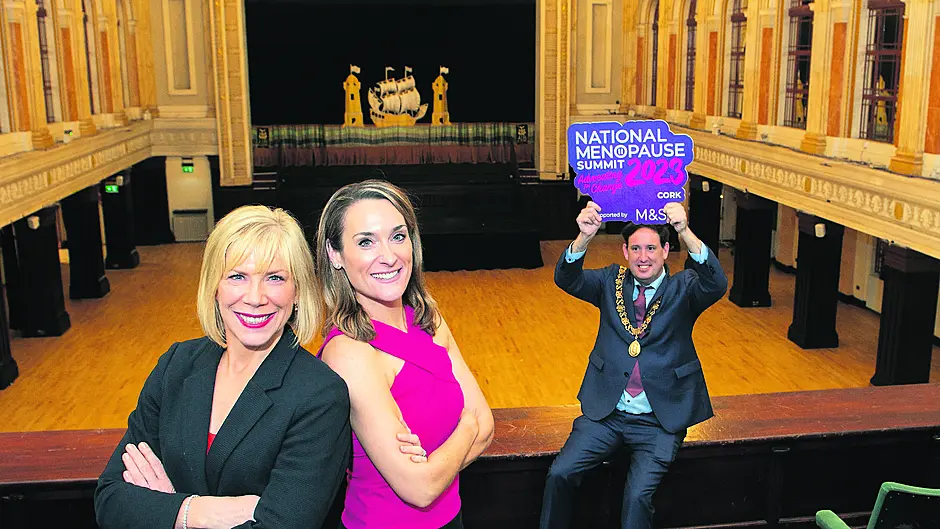A groundbreaking summit taking place in Cork aims to dispel misinformation and help women to manage their menopause, while also teaching businesses how to best support women in the workplace at this time of their lives, writes Mary McCarthy
‘DESPITE the menopause, the wonderful women from Beara to Kinsale must realise that they are the fabulous women they always were.’
That’s according to Sinéad McNamara, founder and co-director of the National Menopause Summit Cork supported by M&S, which takes place in Cork’s City Hall on Friday, October 20th.
Some of Ireland’s leading experts in menopause care and women’s health will gather in Cork for an event expected to attract hundreds of women from across the county. Gráinne Seoige will be the MC on the day and speakers will include UK TV personality Mariella Frostrup, a world-renowned menopause champion.
‘This landmark summit will be a masterclass that affords a fact-based toolkit on how to manage the menopause journey from a personal and workplace perspective,’ said Sinéad. ‘This opportunity is open to everyone. It is to ensure women are empowered to make fact-based decisions around the management of the menopause.’
The summit was inspired by Sinéad’s own menopause journey, where she experienced crippling brain fog. Good has come from her difficulties, which has resulted in something positive in her establishing the National Menopause Summit in Ireland. It takes place two days after World Menopause Day, which falls annually on October 18th.
‘There will be two key narratives discussed as part of the agenda,’ she added, ‘Menopause and the Workplace and the Journey through Menopause. There will be several panel discussions and audience Q and A throughout the day.’
 Supporting the summit: Shalini Wiseman, chartered physiotherapist in pelvic health and continence; Dr Brenda Moran, joint lead of the Complex Menopause Clinic CUMH, accredited menopause specialist and portfolio GP with a special interest in women’s health and sexual health; Dr Máire Finn, GP, educator and broadcaster; Siobhán O’Donovan chartered physiotherapist, creator and founder PostureFitting Physiotherapy Service; Samantha Cushen, lecturer in human nutrition, UCC and Shantie Tedjal-Carroll, menopause mentor, yoga teacher, advocate for women’s wellness and co-founder of the Cork Menopause Support Group. (Photo: Ger McCarthy)
Supporting the summit: Shalini Wiseman, chartered physiotherapist in pelvic health and continence; Dr Brenda Moran, joint lead of the Complex Menopause Clinic CUMH, accredited menopause specialist and portfolio GP with a special interest in women’s health and sexual health; Dr Máire Finn, GP, educator and broadcaster; Siobhán O’Donovan chartered physiotherapist, creator and founder PostureFitting Physiotherapy Service; Samantha Cushen, lecturer in human nutrition, UCC and Shantie Tedjal-Carroll, menopause mentor, yoga teacher, advocate for women’s wellness and co-founder of the Cork Menopause Support Group. (Photo: Ger McCarthy)
The morning session, entitled ‘Menopause and the Workplace’ will feature presentations delivered by barristers and HR professionals, business and union leaders, facilitators and advocates to educate and empower Irish organisations on the introduction of menopause awareness programmes and supports as part of their HR policies.
‘The summit is also there to empower and educate Irish organisations on the introduction of crucial and inclusive menopause supports as part of their HR policies,’ said Sinéad. ‘Traditionally speaking from a HR perspective, there were no menopause supports offered and no training in jobs on how to discuss the menopause. The reason this is so important is for staff retention, as some women choose to leave their jobs, as a result of finding their work increasingly difficult due to menopause symptoms and with no one to talk to about this in the workplace.’
The afternoon session, entitled ‘The Journey through Menopause’ will feature evidence-based information and advice delivered by leading clinicians and healthcare practitioners on how best to manage menopause symptoms both in terms of typical and complex menopause. Issues like nutrition, mental health, pelvic health, sex, and exercise in menopause will be addressed. Healthcare practitioner led advice will give people the best information to safeguard their future health.
In terms of the whole conversation around menopause, 2022 was a seminal year that moved it into the public domain, culminating in the government launching the National Menopause Awareness campaign in October of that year. ‘This was to demystify the stigma and taboo around a very natural part of the female lifecycle that some women were embarrassed to talk about,’ said Sinéad. ‘My feeling was the timing was right to establish the National Menopause Summit to continue the conversation and advocate for change.
‘I realised through my own menopause journey, there was a lot of misinformation on the whole subject,’ Sinéad said. ‘A fact-based summit would educate woman on what to expect to experience, and how best to manage those symptoms from a clinical and evidence-based perspective.’
‘While a number of organisations have begun to introduce menopause awareness programmes and supports, further work needs to be done across the Irish workplace in this regard,’ she added.
 Grainne Seoige will MC the event in Cork. (Photo: Barry McCall)
Grainne Seoige will MC the event in Cork. (Photo: Barry McCall)
Gráinne Seoige will be the MC and her 2022 TG4 documentary Meanapás: Meon Nua explored the topic of menopause, how it is handled in this country and served as a vehicle to debunk menopause for Irish women. Speaker Mariella Frostrup, meanwhile, is the summit’s international guest speaker and her BBC1 documentary The Truth about Menopause in 2018 was one of the first documentaries on menopause, breaking the taboo and speaking honestly about her own menopause experience. She is also the chair of the UK’s Menopause Mandate and has authored the book Cracking the Menopause: While Keeping Yourself Together. The closing speech will be delivered by Roderic O’Gorman TD, Minister for Children, Equality, Disability, Integration and Youth of Ireland.
Dr Brenda Moran, a portfolio GP with a special interest in women’s health and sexual health and an accredited menopause practitioner, says there is now a better understanding of all components of menopause. ‘The average age of the menopause is 51 years in Ireland with an average age range of 45 to 55 years. Women can experience symptoms that can affect them and impact on their long-term health, as well as interpersonal relationships and their work,’ Dr Moran said.
Every woman has an individual experience with a variable number of symptoms. Some women have no symptoms, 75% to 80% of women will experience some symptoms of menopause, with 25% experiencing significant symptoms that will affect quality of life. More common symptoms include: psychological symptoms like anxiety, irritability, and low mood; vasomotor symptoms like hot flushes and night sweats; joint aches and pains; genitourinary symptoms such as vaginal dryness and overactive bladder.
‘If a woman is suffering, it is important to ask for help,’ Dr Moran said. ‘The first port of call is the GP or GP practice nurse or a healthcare professional with additional training in menopause such as a GP, gynaecologist, or advanced specialist nurse. A women’s health physio can help with genitourinary symptoms, such as a prolapse, over active bladder and painful sex. CBT trained practitioners can provide CBT, which helps many menopausal symptoms. There are peer support groups, which can be accessed online or via the local community HSE network. Most symptoms do get better with time and there are a lot of different treatments.
‘The National Menopause Summit will raise awareness on how to get supports, how to access services, and how to discuss menopause in the workplace with your employer and to shape workplace policies if you are an employer,’ she said.
• If you are interested in attending, book tickets at www.nationalmenopausesummit.com
 Mariella Frostrup, who will appear at the National Menopause Summit in Cork.
Mariella Frostrup, who will appear at the National Menopause Summit in Cork.










